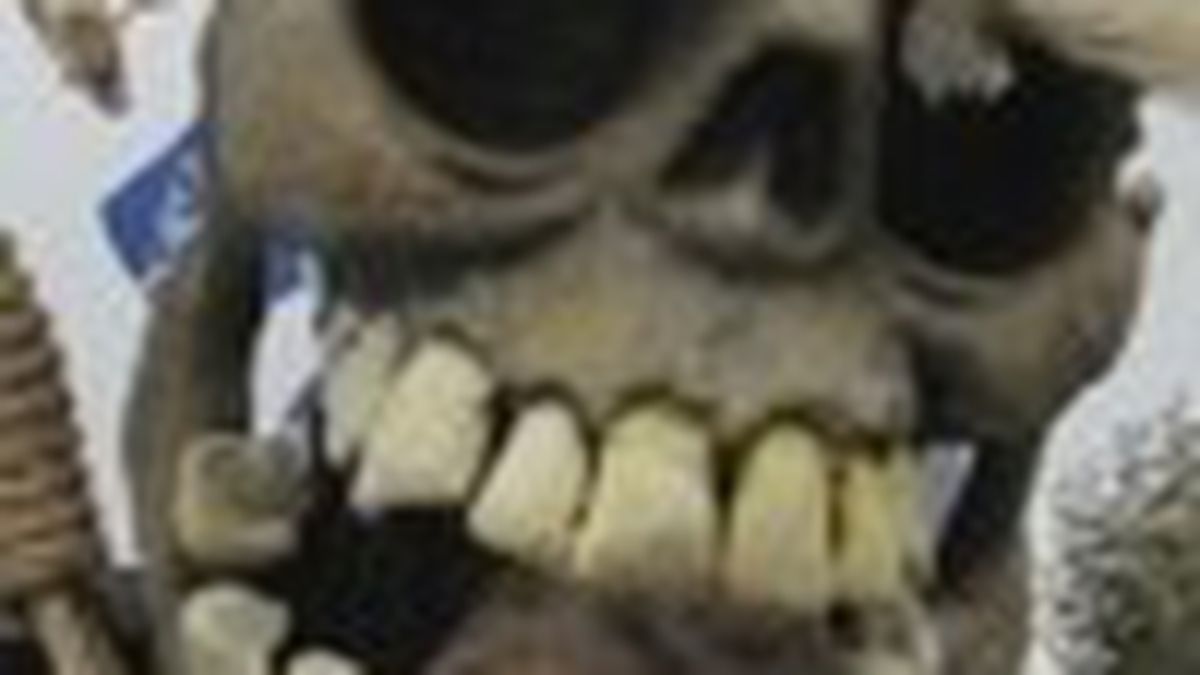Which would you prefer to be: a dashing, risk-taking alpha male or a fearful, go-slow beta? The conventional wisdom says you’re better off alpha. Alpha males give wedgies; beta males receive them. Alphas take lingerie models to parties; betas take lingerie catalogues to the bathroom. And so on. So who’d ever want to be a beta?
Christopher Moore, that’s who. He’s one best-selling author who isn’t afraid to proclaim it loud and proud: “I am definitely a beta male.”
Likewise, Charlie Asher — mild-mannered hero of Moore’s new novel, A Dirty Job (Morrow, $24.95) — is a beta through and through. But that doesn’t mean he can’t kick a little ass when long-clawed creatures from the underworld try to ruin his day. For Moore, beta males aren’t necessarily hapless nerds: “I define a beta male as having an imagination that’s developed beyond what’s really good for him. I’m certainly in that category, and I wouldn’t trade it for anything.”
No wonder. In the fifteen years since Disney optioned his first novel, Practical Demonkeeping, and he quit waiting tables, Moore has used that oversize imagination to produce eight more rollicking tales of monsters, cannibals, and sex — and the occasional divine visitation. His most ambitious book is a humorous life of Jesus (Lamb). Others include a cargo-cult comedy featuring a talking fruit bat (Island of the Sequined Love Nun) and a cracked Christmas story with flesh-eating zombies (The Stupidest Angel). If there were such a thing as a typical Moore novel, it would probably come off like a cross between Evil Dead 3, The Hitchhiker’s Guide to the Galaxy, and a street riot in South Park.
It’s a hugely crowd-pleasing combination. On Internet message boards, the question isn’t so much whether Moore is funny as whether he’s hilariously funny, spit-milk-out-your-nose funny, or don’t-read-this-book-on-the-subway funny. What ties his fans together? Well, Moore thinks it might have something to do with the funny.
“My readers all seem to have some sense of irreverence — either overt or stealth. They are either smartasses or would like to be. They tend to Ôget’ the joke. The kind of people who don’t like my books tend to be those who need function in a story. They aren’t satisfied with being entertained, or they don’t delight in silliness.”
Moore cites his father, an Ohio highway patrolman, as an early comedic influence. “I can remember him telling the story of filling out a report with a coroner about a woman who had had both of her legs taken off in an accident. The coroner asked, ÔApproximate height of the deceased?’ And without missing a beat, my dad said, ÔYou mean now, or before?'”
The quip might have come straight from the wisecracking mouth of A Dirty Job‘s Charlie Asher. An unassuming, thirtyish San Franciscan with a sharp sense of humor, Asher has an uneventful life running a thrift shop on the edge of North Beach. Then, in a sudden transformation, he becomes — well, he’s not exactly sure. Death, perhaps, or Death’s errand boy. As if that weren’t enough, he also has to contend with an apocalyptic prophecy, a trio of bloodthirsty (but kind of sexy) demons, and a baby daughter with uncanny powers.
As in Moore’s other books, the gags come thick and fast. But A Dirty Job also hits serious notes about death, loss, and longing. The idea for the book came to Moore while caring for his dying mother and helping his girlfriend care for hers. Those were his first close encounters with death, and entire conversations and scenes from his own experience found their way into the story. It struck him that much of the unpleasantness around death comes from people’s unwillingness to talk about it:
“My mother was very secretive about her illness. I was with her for five months in Ohio, running her errands and so forth as she became more and more ill, and she forbade me from telling any of her friends about her sickness. They just thought she was being a bitch and avoiding them. When she finally died, everyone was torn between sympathy and anger. And I realized that my mother’s passing would have been easier if she’d let her friends into the process. I’m not being critical of her — one of the problems is that we don’t get any practice, because the process is hidden away. No one knows the right way to die. I think if we were more open about it, invited it in as part of our lives, as it is, then we could alleviate a lot of the fear and loneliness of dying.”
In A Dirty Job, people die all sorts of ways: peacefully, violently, in their beds, on the street. Did writing the book exorcise Moore’s own fears about death? Not exactly.
“I’m afraid of being in pain and of being afraid,” he admits. “And I’m afraid I won’t get everything done.”
At this rate, he won’t leave much unfinished business behind. He’s plotting a move to the Bay Area — until now he’s been dividing time between here and Hawaii — and he’s already at work on his next book, due out next year. It’s the sequel to his San Francisco vampire tale, Bloodsucking Fiends. Its title? You Suck: A Love Story.











